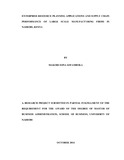| dc.description.abstract | Manufacturing organizations are facing intense pressure to provide customers with
shorter times between order and delivery and between product conceptualization and
realization, greater product customization, and higher product quality and performance, at
the right price. To meet this challenge, companies in the manufacturing industry are
being forced to implement ERP systems to better their supply chain performance in order
to remain competitive. This study focused on ERP applications and supply chain
performance of large scale manufacturing firms in Nairobi, Kenya. It had three
objectives: to determine the extent of ERP application in the supply chain of large scale
manufacturing firms in Nairobi, to establish the impact of ERP on the supply chain
performance for large scale manufacturing firms in Nairobi, and lastly to determine the
challenges that are faced in integrating ERP applications in the supply chain of large
scale manufacturing firms in Nairobi. This study adopted descriptive survey design where
the target population was the large scale manufacturing firms in Nairobi. Stratified
random sampling technique was used to select the firms. The questionnaire was used as
the research instrument which was self-administered and collected after completion by
the researcher. Collected data was analyzed using SPSS frequencies, percentages, means,
standard deviations and regression analysis. The findings were presented using pie chart,
bar graph, and frequencies tables. Study findings revealed that a majority of the
manufacturing organizations were using ERP applications, and in most organizations
there were common modules that were preferred by the companies. In as much as the
ERP applications are being used, about 70 percent of the capacity of the applications is
utilized. This shows there is still much room for improvement in the way the applications
can be used. The findings of this research indicated that there’s a positive significant
relationship between ERP applications and supply chain performance despite the
challenges that are faced by organizations when it comes to implementation. From the
study, the following recommendations were made: there is need for manufacturing
organizations to apply all the ERP functionalities if they are to improve their supply chain
performance. The study findings imply that the successful implementation and the
effective usage of ERP applications can contribute toward enhancing supply chain
performance in many ways. This study recommends the need for manufacturing
organizations to apply all the ERP modules if they are to improve their supply chain
performance. | en_US |

